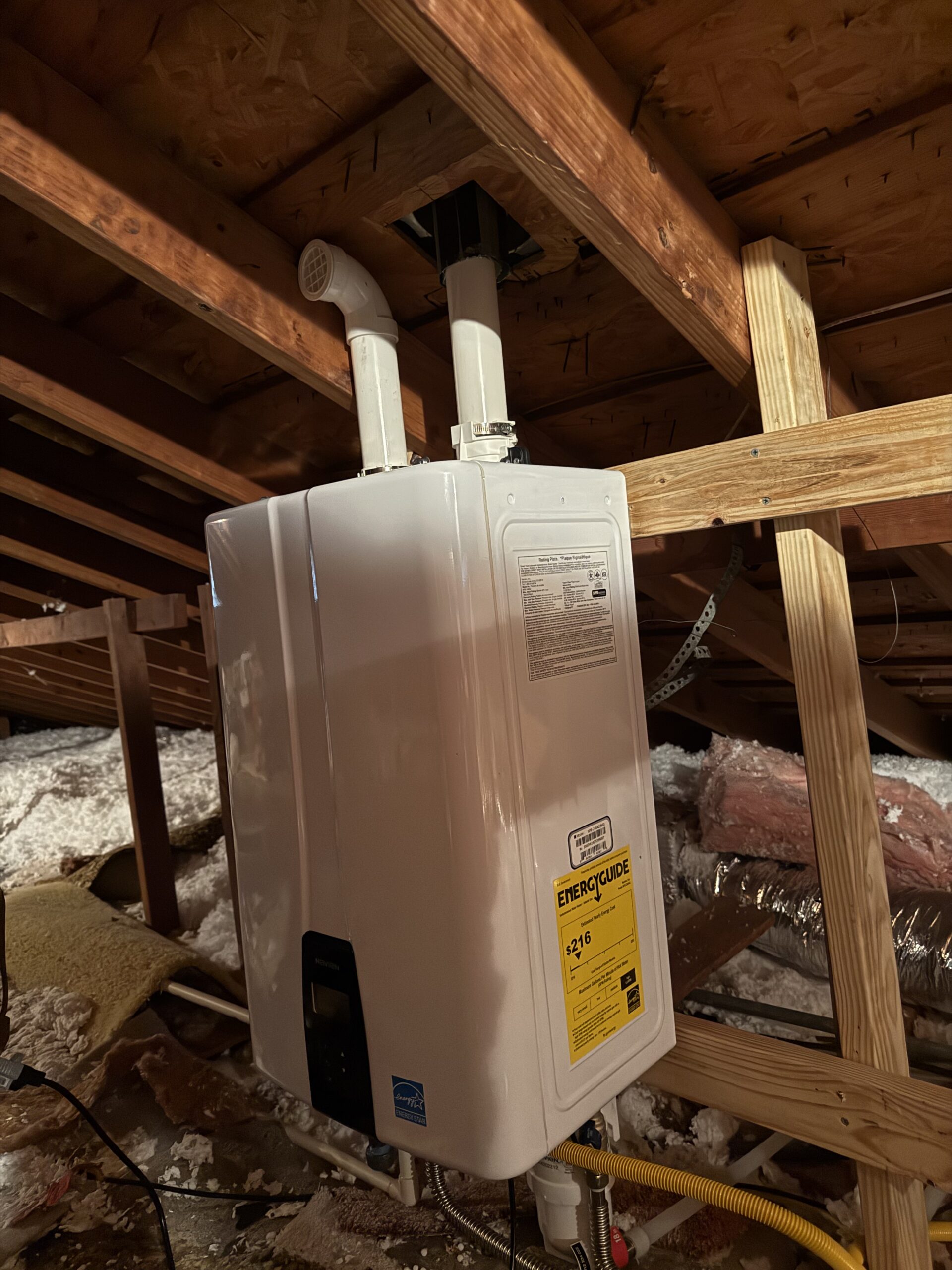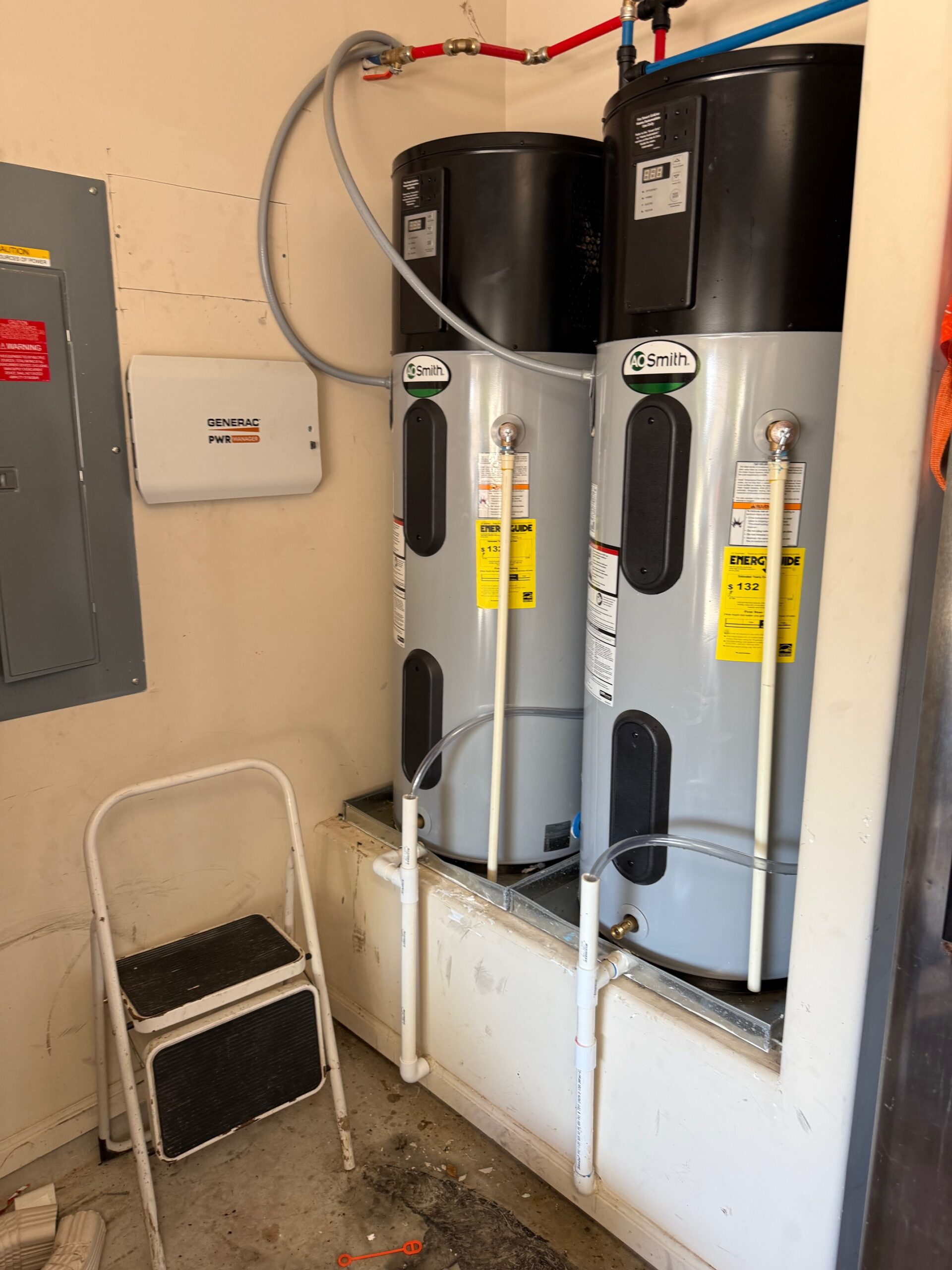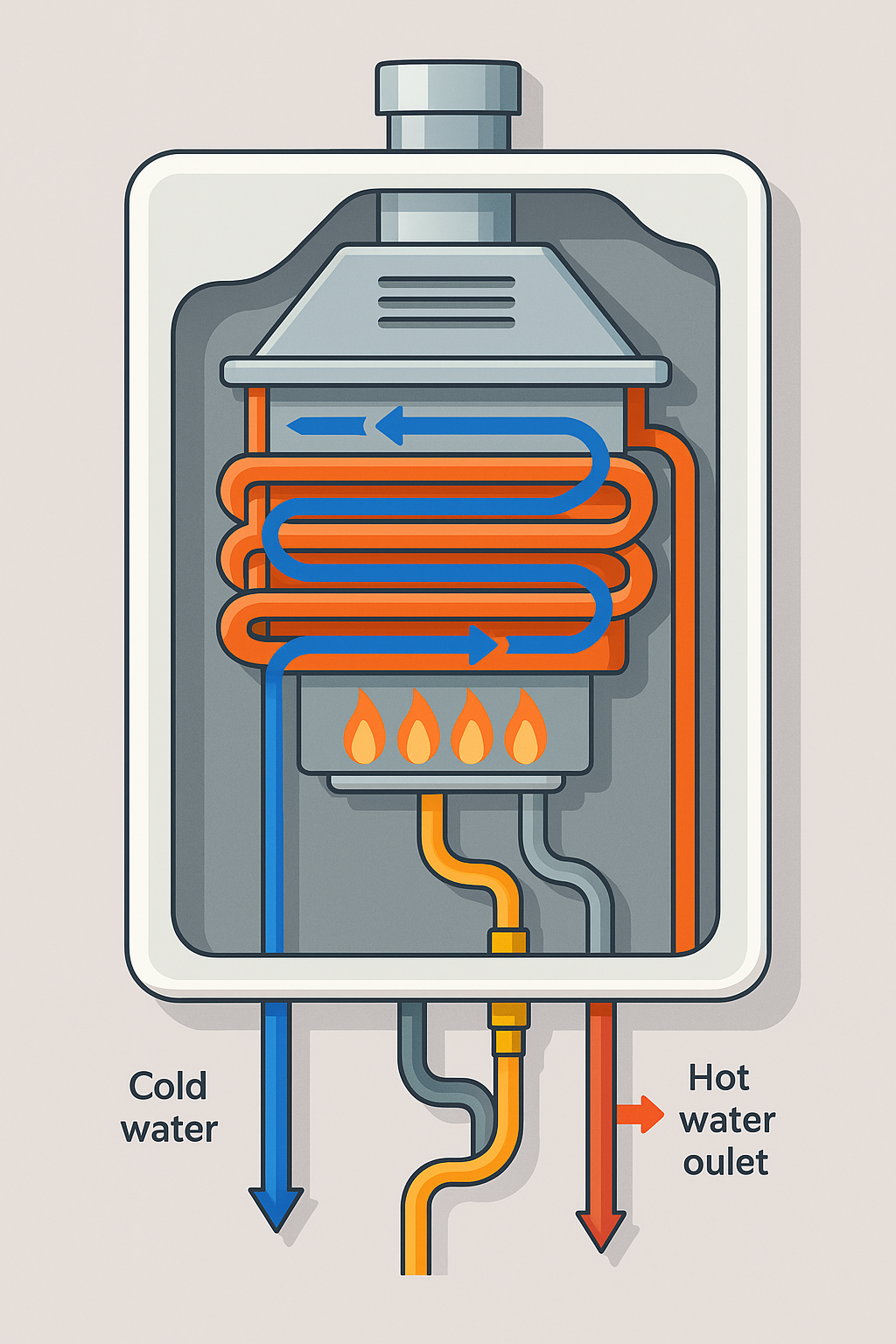
Find the Perfect Water Heater For Your Needs

Replacing a hot water tank is a significant home upgrade, and understanding your options is key to making the right choice. Hot water tanks typically last 6–12 years, depending on water quality, usage habits, and unit placement. Whether you’re replacing your current tank with a similar model, upgrading to a larger capacity, or switching to a tankless unit, factors such as household size, energy source, efficiency, recovery rate, and location should all be considered. For example, a family of 3–4 may benefit from a 40–50-gallon tank, while households with 5+ members might consider a 50–80-gallon tank or tankless system. Placement matters, especially in Texas where many tanks are installed in attics above bedrooms, which adds weight and risk in the event of a leak or failure. When you’re ready, Bluebonnet Waste and Water’s licensed professionals are here to help select the right system for your needs.
The cost of hot water tank replacement varies widely, typically between $2,500–$6,000, depending on tank size, installation complexity, removal of the old unit, permits, and whether you’re choosing electric or gas. Gas units tend to have faster recovery and lower energy costs but require venting and higher upfront installation expenses. Electric tanks are more budget-friendly to install but usually cost more to operate long-term. Leaks are one of the first signs it’s time for a replacement, often caused by corrosion, a worn anode rod, a faulty drain valve, or excess pressure. To avoid future issues, Bluebonnet’s certified technicians ensure every job meets code, includes leak-prevention measures, and is backed by our 2-year labor warranty and 5-year worry-free extended protection. We even offer a Same-Day Replacement Guarantee to get your home back to normal—fast.
Traditional Hot Water Tank Replacements

Bluebonnet Waste & Water offers a selection of high-quality Rheem and AO Smith water heaters when it comes to replacing a traditional hot water tank. These brands are renowned for their reliability and performance, providing our customers peace of mind and consistent hot water. When choosing a conventional water heater, it’s essential to consider factors such as the size of your household, water usage patterns, and available space for installation. Our team is ready to help you evaluate these factors, ensuring you choose a water heater that meets your requirements and fits seamlessly into your home.
Hot water tank replacement. Hot water tanks have a lifespan of 6 – 12 years. The time may vary based on water conditions, family lifestyle, and location of the hot water tank. A hot water tank can be replaced by a similar or larger hot water tank or converting it to a tankless hot water unit. When selecting a hot water tank replacement, consideration should be given to you household size, energy source and energy efficiency. If your household is 3-4 people, we recommend a 40–50-gallon tank and for households greater than 5+ people, we recommend a 50-80+ gallon tank or converting to a tankless hot water unit. An important consideration of hot water tank replacement is the recovery rate of a hot water heater. The recovery rate is especially important for families that take back-to-back to back showers or high water demand. When replacing a hot water tank, it also gives thought to location and the dimension of the hot water tank replacement. In Texas, many of the units are in the attic above a bedroom. Although the placement provides minimal pipe run to the bedrooms and showers, it also puts a 500-pound weight above a bed. When you are ready to replace the hot water tank, make sure you consult with Bluebonnet Waste and Water. Consult our expert team of technicians to ensure the correct unit is selected for your household.
Water heater replacement costs. There are several variables when estimating the cost to replace a hot water tank. Removal of the old tank, pipe rerouting, replacement complexity, permits, power source (gas vs electric), and tank model are all factors that help determine the cost of replacing a hot water tank. Broadly speaking, hot water tank replacement can cost between $2,500 – $6,000. The wide range is due to the size of the tank, installation complexity and cost of the tank. A high-efficiency or hybrid model can cost 2-3X the price of a base model, but the homeowner is able to recapture the cost with lower utility bills over time.
Hot water tank leaks. One of the first visual indications that it is time to replace your hot water tank is that you notice the hot water tank leaking. There are several reasons when a hot water tank may leak. First, the tank is old and starts to corrode from the inside out or from the outside in. All hot water tanks have an anode that help reduce the corrosion rate inside the tank. If the anode is worn out and not replaced, then the water starts to corrode the tank. Inside of eating away at the anode, corrosion will start eating through the metal which can cause leaks from the body itself. All hot water tanks have a drain valve. If the drain valve accumulates sediment, is loose or worn, it can be a leading factor to a leaking hot water tank. Frequently a slow drip from the drain valve can lead to a larger problem. We recommend frequent inspection of the hot water tank drain valve to ensure it is not leaking. If the hot water tank has excessive pressure or temperature, it can cause the temperature relief value (TPR) to malfunction which can cause the hot water tank to leak. To help mitigate a faulty pressure relief value, an expansion tank can be installed which helps to regulate the pressure and temperature.
Extended Warranty. Most plumbing companies provide a 1-year labor warranty. We are so confident in our technicians and workmanship that we provide a 2-year labor warranty, and a 5-year extended worry-free warranty program.
Benefits of Tankless Water Heaters

Tankless water heaters provide a modern solution with numerous advantages over traditional water heaters. One of the primary benefits is the ability to heat water on demand, which means you’ll have a continuous supply of hot water whenever you need it, even during peak usage times. This feature is particularly beneficial for larger households where multiple showers and appliances might be used simultaneously. Additionally, tankless water heaters are more energy-efficient as they only heat water when needed, reducing overall energy consumption and lowering utility bills. Another significant advantage is their compact size, making them ideal for homes with limited space. Unlike bulky traditional tanks, tankless units can be mounted on walls and tucked away, freeing up valuable floor space. Moreover, tankless water heaters have a longer lifespan than traditional tanks, offering years of reliable service with minimal maintenance. The advanced technology in Navien tankless water heaters also includes digital temperature control and remote monitoring, providing added convenience and control over your home’s hot water supply. Investing in a tankless water heater enhances your home’s efficiency and contributes to a more sustainable lifestyle by reducing energy waste.
Converting to a tankless hot water heater offers a variety of advantages that make it an attractive upgrade for many homeowners. These systems provide endless hot water, improved energy efficiency, and a compact space-saving design—making them especially ideal for larger or growing households. Because tankless units heat water only on demand, they reduce standby energy loss and can result in substantial utility savings over time. Additionally, tankless units can be installed outside the home, reducing the risk of water damage from leaks often associated with attic-installed traditional tanks. When properly maintained, tankless systems can last 15–20 years, nearly doubling the lifespan of a conventional tank.
$500 Off Hot Water Tankless Conversion.
Call 832-365-4949 For Details
While tankless systems come with a higher initial installation cost, their long-term value is substantial. Installation may involve upgrades to gas lines, venting, or plumbing layout, but these are easily managed by experienced technicians like the team at Bluebonnet Waste and Water. Not only does a tankless system offer lower lifetime energy costs, but it also boosts home value as more buyers are looking for modern, energy-efficient upgrades. These systems function by instantly heating water as it flows through a coil system, meaning there’s no stored hot water and less wear on the system. Thanks to robust construction, on-demand operation, and serviceable components, tankless water heaters deliver long-lasting, efficient performance. Plus, Bluebonnet’s 2-year labor warranty and 5-year extended warranty ensure peace of mind for years to come.
Tankless water heater installation. Installing a tankless hot water heater can be a more complex installation than compared to a direct hot water tank replacement. When converting from a traditional hot water tank, an evaluation will need to be completed to determine if the gas lines need to upgrade and if additional venting will need to be required. Additionally, some piping modifications may need to be performed to ensure fast hot water to various parts of the house. At Bluebonnet, our expert team of technicians can assess your household needs and requirements to ensure we are sizing the tankless hot water heater correctly, considering the ideal location to minimize installation costs and disruptions. Lastly, ensure your installation company is properly licensed to meet all building codes and requirements. Bluebonnets team of technicians are expertly trained and supervised to ensure they are installing all necessary safety features and precautions such as pressure relief valves and shutoff systems to minimize risks and provide years of endless hot water.
Extended Warranty. Most plumbing companies provide a 1-year warranty on labor. Bluebonnet Waste and Water believes this is too short. We provide a standard 2 year warranty on labor and an extended 5-year warranty. Bluebonnet Waste and Water is committed to providing everyone customer with peace of mind knowing their tankless hot water unit will be installed correctly and provide many years of uninterrupted service.
Personalized Water Heater Solutions For Every Customer
At Bluebonnet, we are committed to understanding each household’s unique water heating needs. Our experienced team takes the time to assess your water usage, lifestyle, and available budget to provide you with the most suitable options. By evaluating these factors, we can recommend a water heater that balances performance and cost. We offer both traditional and tankless water heaters, ensuring we have the perfect solution for every situation. Our goal is to provide a tailored experience, helping you find a water heater that integrates seamlessly into your home while offering efficiency and reliability. Whether you prefer a traditional tank’s familiarity or a tankless system’s modern benefits, we are here to guide you every step of the way.
Making The Right Choice For Your Home
Selecting the appropriate water heater for your home involves several key considerations. First, think about your household’s hot water needs. Larger families with high hot water usage might benefit from the continuous supply offered by tankless water heaters, which can efficiently manage multiple simultaneous demands. On the other hand, traditional water heaters with larger tank capacities can be suitable for households that prefer having a reserve of hot water available at all times.
Space is another crucial factor. Traditional water heaters typically require a dedicated area, whereas tankless models are compact and can be mounted on walls, saving valuable floor space. This makes tankless options ideal for homes with limited space.
Energy efficiency and cost are also important. Tankless water heaters generally offer better energy savings over time, as they heat water on demand and avoid the standby energy losses associated with traditional tanks. This can lead to lower utility bills and a reduced environmental footprint. However, it’s essential to weigh the initial installation cost, which can be higher for tankless systems, against the long-term savings on energy bills.
Also, could you consider the maintenance and lifespan of each type? Tankless water heaters often require less maintenance and have a longer lifespan than traditional tanks. This can translate to fewer disruptions and more years of reliable service.
Ultimately, the best choice will depend on your specific circumstances, including budget, space, and hot water usage patterns. Our team at Bluebonnet Waste & Water is dedicated to helping you navigate these considerations and ensure you select a water heater that meets your needs and enhances your home’s efficiency and comfort.
Hybrid Solar Hot Water Tanks
Many homeowners in Texas have converted to using solar panels to harness the sun’s energy to lower their energy bill. Solar panels convert the suns heat and energy to electrical energy which can be used by the homeowner or sold back to the power grid. Did you know solar panels can also heat the water for your water heater? A frequently overlooked benefit of solar panels is to heat you hot water coupled with a secondary source such as electric or natural gas is used for cloudy or high-demand periods.
How does a Solar Hot Water Tank Work
A hybrid solar hot water tank uses thermal solar panels to capture the energy from the sun. In a photovoltaic panel, semiconductors covert the sunlight into direct current (DC) electricity which is converted to alternating current (AC) by an inverter. A thermal panel uses either water or antifreeze to absorb the heat from the sun to heat the liquid which is direct to the hot water tank or exchanger to heat the hot water. Thermal solar panels work great for water heaters or heating a pool in the spring. Thermal panels are highly efficient at converting sunlight to heat which results in low energy bills. Bluebonnet are experts in hybrid solar hot water installation.
Hot Water: Day and Night
The solar panel will continuously heat the hot water during the day and transfer the heat to the hot water tank or heat exchanger while it is sunny. The long periods of sunshine and the highly efficient solar panels make the solar energy as the primary heat source. Hot water tanks are well insulted vessels which means they retain their heat and potential during the periods when demand is needed.
If hot water demands are high during dark periods or long periods of cloudy weather, the system will automatically switch to the backup heating system. In Texas, the most common backup will be either electrical or natural gas heaters. A backup energy sources ensures your hot water heater will provide uninterrupted service regardless of the weather conditions.
Consistent Hot Water
When solar power is unavailable due to cloudy weather conditions, nighttime or high water usage, the backup system will automatically turn on to provide hot water. The system uses a thermostat in the tank to continuously monitor the temperature. When the temperature drops below the set threshold, the system will send a signal to turn on the back up heater. If the system is electric, then a resistance heater will start heating the water. If natural gas is used, the gas heater will turn on to start heating the water. Once the desired temperature is reached the burner will turn off and return to a ready-state.
Why Choose Bluebonnet Waste & Water
Bluebonnet Waste & Water sets itself apart with our expertise and a commitment to excellence in water heater installations. Our skilled team brings years of experience, ensuring that every installation meets the highest standards. We understand that each home has unique needs, and our customized approach guarantees a solution that fits perfectly with your requirements. From helping you choose between traditional and tankless options to providing ongoing support, we prioritize your satisfaction at every step. Our dedication to quality service means you can trust us to deliver reliable, efficient, and long-lasting water heater solutions that enhance your home’s comfort and efficiency. Choose Bluebonnet for a seamless, professional experience.
Extended Warranty. Most plumbing companies provide a 1-year warranty on labor. Bluebonnet Waste and Water believes this is too short. We provide a standard 2 year warranty on labor and an extended 5-year warranty. Bluebonnet Waste and Water is committed to providing everyone customer with peace of mind knowing their tankless hot water unit will be installed correctly and provide many years of uninterrupted service.
Bluebonnet Waste and Water is a locally owned and operated company dedicated to providing Houston with the best waste and water upgrade services. Founder and President Kara is committed to every installation and ensuring every customer is satisfied with their experience. Please contact us for your next hot water replacement, tankless conversion and the next restroom trailer event.
Frequently Asked Questions
When considering everything that is involved with replacing a hot water heater, there are several points to consider when determining how to replace a hot water heater. First, code compliance and safety should be a top consideration. Ensure the plumbing company meets local plumbing codes, venting rules and safety standards. Safety is especially important for gas lines, pressure relief valves and expansion tanks. As many hot water tanks in Texas are in the attic, ensure that connections are properly made and their leak prevention and water shutoff devices installed to prevent costly repairs. A professional plumber from Bluebonnet will ensure the water, gas and electrical hookups are correct to minimize leaks, back drafting and future failures of the hot water tank replacement. Lastly, a professional plumber can provide a efficient and hassle-free experience. Bluebonnet technicians have the tools, training and experience to remove the old tank, install the new one and ensure everything is running smoothly. The team at Bluebonnet has decades of experience getting your hot water tank replaced typically less than a day. Be sure to ask Bluebonnet about our Same-Day guarantee when considering a plumbing company to replace your hot water heater.
We are frequently asked if a gas hot water tank or an electric hot water tank is better. Gas hot water tanks have faster recovery times and lower energy bills but will require venting and have higher installation costs. Electric hot water tanks have lower upfront costs and are less expensive to install but have slower recovery times and cost more over several years of usage. Bluebonnets expert technicians can assist in providing you with an estimate and a review of what hot water tank is best for your household.
We are frequently asked about why someone would want to convert to a tankless hot water unit. The benefits of converting to a hot water unit are numerous but the top 3 benefits include endless hot water, improved energy efficiency and space saving design. For large or growing households, a tankless hot water heater cannot be beat. A tankless hot water unit is designed to heat the water on demand, which means you never run out. Cold water is instantaneously heated when someone turns the hot water faucet on. Because the hot water is heated only when the demand is needed, a tankless hot water unit is more energy efficient. A hot water tank maintains a constant hot water source regardless of whether the homeowner is home or on vacation. A tankless hot water unit only heats the water when needed which results in lower energy bills. A tankless hot water is a small, robust design that can be installed inside or outside. Frequently a hot water tank is installed in the attic above the bedrooms. A tankless unit can be installed outside near the gas main. This provides two advantages; first removes 50-80 gallons of water leak in the attic (reduce the risk of thousands of dollars of damage) and second, it is installed next to the gas source minimizing the length of gas piping inside the house. Finally tankless water heaters have a longer lifespan compared to hot water tanks. With proper maintenance, a tankless hot water unit can have a lifespan of 15-20 years.
Great question and it really is a case-by-case answer. The long-term energy savings is undeniable. Tankless hot water units cost more to install compared to a direct replacement, but as tankless units heat on the water required, there is potentially a yearly savings of $100 – $300+ / years of savings on the utility bills. Given the longer longevity of a tankless system compared to a traditional hot water tank, the utility savings over the 15–20-year lifespan makes the lifetime investment, or return of investment (ROI), favor a tankless hot water unit. Many homebuyers today are looking for homes that already have tankless hot water upgrades already completed. Homebuyers perceive the conversion to a tankless hot water unit as a home upgrade which leads to increased home value and a modern upgrade.
Due to tankless hot water units being a robust system utilizing a high efficiency heat exchanger, they last longer than traditional hot water tanks. The increased lifespan of the unit is due to several key factors such as no standing water, on-demand operation and serviceable components. A leading factor of leaking hot water tanks is due to the corrosion of hot water tanks due to the long period of stagnant water causing corrosion internally of a tank. Tankless units operate with an on-demand operation which reduces the wear and tear of components compared to hot water tanks which are constantly keeping the water warm. Finally, most of the internal components of tankless hot water units (heating elements and sensors), are easily serviceable by a trained technician, resulting in extended useful life of the water heater.
Solar hybrid hot water heaters is highly reliable when properly installed and maintained. First, there is a dual heat source. Most hot water heaters use a single heat source but the solar hybrid system using solar as the primary source and electric/gas as the backup. Regardless of conditions, the homeowner will get uninterrupted and consistent hot water. The system will automatically switch between solar and backup without any input from the homeowner. The hybrid system has fewer moving parts than a traditional boilers and the components of the solar system are durable which further adds to the system longevity and lowering the risk of failure.
With routine maintenance and upkeep, solar hybrid hot water systems can last 15-20+ years. As with any system there are some items that should be routinely checked to ensure uninterrupted service. Checking solar panels, inspecting for leaks/corrosion, testing the backup heater, replacing the anode rod, inspecting pressure relief valve and temperature settings are a few items that should be checked annually. Bluebonnet has maintenance programs that will extend the warranty of the solar hybrid hot water heater.

